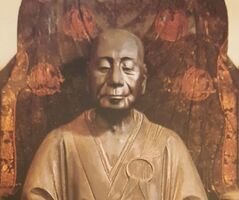Mujū Ichien
| PersonType | Category:Classical Japanese Authors |
|---|---|
| FirstName / namefirst | Mujū |
| LastName / namelast | Ichien |
| MainNamePhon | Mujū Ichien |
| SortName | Ichien, Mujū |
| bio | Mujū lchien. (無住一円) (1227-1312). A Japanese monk during the Kamakura period; also known as Mujū Dōgyō. He was born into a warrior family and became a monk at the age of eighteen. Mujū studied the doctrines of various sects, including the Hossōshū, Shingonshū, Tendaishū, and Jōdoshū, and received Zen training from the Rinzaishū monk Enni Ben'en (1202-1280). In 1262, Mujū built Chōboji (Matriarchal Longevity Monastery) in Owari (present-day Nagoya, a port city in the center of the main Japanese island of Honshū), where he spent the rest of his life. Although affiliated with the Rinzaishū, Mujū took an ecumenical approach to Buddhism, arguing that all the different teachings of Buddhism were skillful means of conveying the religion's ultimate goal; he even denounced Nichiren (1222-1382) for his contemporary's exclusivist attitude toward his own eponymous sect. Mujū was also famous for his collections of Japanese folklore, such as the Shasekishū ("Sand and Pebbles Collection"), written between 1279 and 1283; his Tsuma kagami ("Mirror for Wives") of 1300; and his 1305 Zōdanshū ("Collection of Random Conversations"). In particular, in the Shasekishū, Mujū introduced the idea of the "unity of spirits and buddhas" (shinbutsu shūgō) , describing the Japanese indigenous gods, or Kami, as various manifestations of the Buddha. (Source: "Mujū lchien." In The Princeton Dictionary of Buddhism, 552. Princeton University Press, 2014. http://www.jstor.org/stable/j.ctt46n41q.27.) |
| YearBirth | 1227 |
| Other wikis |
If the page does not yet exist on the remote wiki, you can paste the tag |

